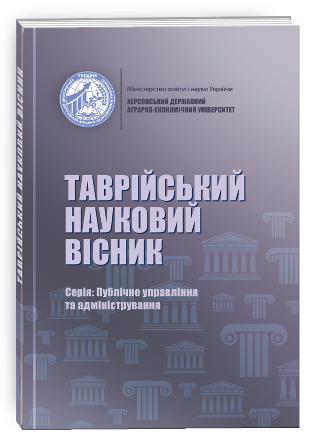POLITICAL MANAGEMENT IN THE CONTEXT OF MARTIAL LAW
DOI:
https://doi.org/10.32782/tnv-pub.2025.2.15Keywords:
political management, martial law, crisis management, public administration, leadership, political warfare, national securityAbstract
The article provides a comprehensive analysis of political management in the context of martial law, which is particularly relevant for Ukraine amidst the full-scale invasion by the aggressor state. It analyzes that during a period of unprecedented socio-economic, political, and crisis challenges, effective political governance becomes critically important for guaranteeing national security, preserving state sovereignty, and sustaining the country’s vital functions. It is revealed that the application of proven theoretical approaches serves as the foundation for developing adequate management strategies and tactics, which not only provide analytical tools for understanding political management in the context of martial law but also form a methodological basis for making operational and strategic decisions aimed at mobilizing all resources, coordinating efforts, and consolidating society for victory in the Russian-Ukrainian war. A review is conducted of existing scientific approaches to understanding the concept of «political management,» including functional, institutional, behavioral, resource-oriented, systemic, and technological approaches, which analyze it as a sequence of processes, the interaction of institutions, the behavior of actors, resource optimization, systemic interconnections, and the application of specific tools for achieving political goals. The prerequisites for the development of political management in the theory of political science are explored, among which are highlighted the needs for effective governance and strategizing, the narrowing of opportunities to overcome problems in the sphere of political-power relations, the formation of values and principles of a rule-of-law state, the development of ideological and political pluralism, as well as the growing importance of political management in the modern political process, which has led to its professionalization and differentiation. The application of key theoretical concepts of political management in the context of martial law is comprehensively characterized, such as crisis management theory, public administration theory, theoretical foundations of leadership in wartime, political warfare theory, and national security theory. It is substantiated that these theories do not function autonomously but demonstrate an organic interaction, forming a comprehensive and complementary methodological basis for effective political management in conditions of martial law. The challenges faced by political management in Ukraine due to the full-scale invasion in 2022 are separately examined, and its key areas are identified, including ensuring national security and defense, maintaining the economy, social stability and preventing humanitarian crises, information and communication management, international relations and European integration management, and public service and personnel management. It is summarized that political management in the context of martial law is a complex, adaptive, and purposeful system of managerial actions by subjects of state power and civil society, based on the principles of crisis management, national security, and political warfare, aimed at mobilizing all national resources, consolidating society, effectively coordinating military, diplomatic, informational, and economic efforts, as well as forming resilient leadership to ensure the survival of the state, the protection of its sovereignty, and the achievement of victory in the face of existential threats.
References
Богаченко М.М. Сучасні наукові концепції політичного менеджменту. Актуальні проблеми політики. 2021. № 67. С. 47–52.
Картунов О., Маруховська О. Політичний маркетинг і менеджмент. Політичний менеджмент. № 6, 2004. С. 137–163. URL: http://nbuv.gov.ua/UJRN/PoMe_2004_5_17 (дата звернення: 02.05.2025)
Щербак В. М. Політичний менеджмент: наукове поняття та політична практика. Вісник Дніпропетровського університету. 2015. № 2. С. 18–24. URL: https://visnukpfs.dp.ua/index.php/PFS/article/view/677/717 (дата звернення: 11.05.2025)
Возовик О. О. Класифікація принципів антикризового управління у публічній сфері. Публічне адміністрування та державне управління. 2023. № 3, С. 77–82. URL: http://pdu-journal.kpu.zp.ua/archive/3_2023/3_2023.pdf (дата звернення: 09.05.2025)
Чорний А.В. Сучасні теорії лідерства: загальний огляд і структурна модель. Наукові записки Національного університету «Острозька академія». Серія «Економіка»: науковий журнал. Острог: Вид-во НаУОА, червень 2018. № 9(37). С. 78–84. URL: https://eprints.oa.edu.ua/id/eprint/7289/1/15.pdf (дата звернення: 04.05.2025)
Якушко Н.О. Теорії лідерства: генеза та сучасна інтерпретація. Право та державне управління. 2016. № 4 (25), С. 130–135.
Пономаренко О.С. Вплив воєнних дій на ефективність державного управління в України. Академічні візії. Випуск 32/2024. С. 1–12.
Валіулліна З.В. Військова теорія К. Клаузевіца в теоретичному дискурсі. Ефективна економіка. № 11, 2017. URL: http://www.economy.nayka.com.ua/?op=1&z=5881 (дата звернення: 12.05.2025)
Фурсіна Н.А. Теорія виникнення військових конфліктів, воєн. Економіка та держава № 12/2018. С. 81–88. URL: http://www.economy.in.ua/pdf/12_2018/18.pdf (дата звернення: 13.05.2025)







